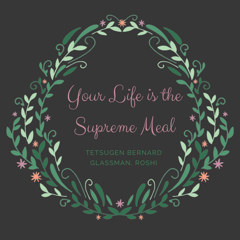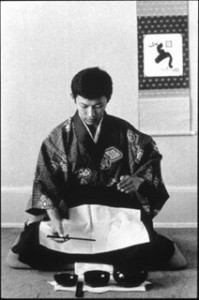Sunday
Featured StoriesMeal Blessings and Great Eastern Sun
A natural foods chef looks at how meal blessings can fundamentally change our relationship to food, and help repair our relationship to the natural world
by Marcella Friel
 Several months ago, I was visiting a dear sangha friend who read to me the following excerpt from Acharya Jeremy Hayward’s book, Warrior King of Shambhala: Remembering Chögyam Trungpa. The excerpt recounts a comment made by a Tibetan lama named Thrangu Rinpoche, who was one of the Dorje Dradul’s closest heart brothers and friends:
Several months ago, I was visiting a dear sangha friend who read to me the following excerpt from Acharya Jeremy Hayward’s book, Warrior King of Shambhala: Remembering Chögyam Trungpa. The excerpt recounts a comment made by a Tibetan lama named Thrangu Rinpoche, who was one of the Dorje Dradul’s closest heart brothers and friends:
[The Dorje Dradul] told me that America is a very developed country, in many ways. But there was a problem because there’s been so much destruction of the land, the land has been wasted and destroyed…. Also most people in America aren’t from this land but come from other places originally, and are not indigenous to the land, so they don’t have any particular native culture…. So although externally it is a highly developed country, the people suffer inwardly from diminished or depressed life energy, and depressed or damaged drala….
In the instant I heard these words, I recognized the root of our collective struggle with mindful eating.
 Food culture is the basis of human culture. For millennia, indigenous societies have anchored and organized themselves around the tribal rituals of growing, hunting, harvesting, preparing, and eating food. The reliability of those cycles—planting in the spring, tending in the summer, harvesting in the fall, and storing for the winter—connected human beings directly to each other and to the rhythms of nature. It created a sense of belonging both to the tribe and to the dralas, or elemental forces, that birthed the food on the table.
Food culture is the basis of human culture. For millennia, indigenous societies have anchored and organized themselves around the tribal rituals of growing, hunting, harvesting, preparing, and eating food. The reliability of those cycles—planting in the spring, tending in the summer, harvesting in the fall, and storing for the winter—connected human beings directly to each other and to the rhythms of nature. It created a sense of belonging both to the tribe and to the dralas, or elemental forces, that birthed the food on the table.
According to renowned Zen chef Edward Espe Brown, the cultures that are still connected to these rituals have the lowest occurrences of eating disorders. “Conversely,” Brown explains, “we see that ours is a culture with few eating rituals and numerous disorders.” In modern society, few of us, as Thrangu Rinpoche noted, live on the land we came from. We eat a diet that’s not only radically different from our ancestral fare; it’s a diet that’s disembodied from the earth itself.
 Divorced from the natural cycles and tribal activity that brought food to us in the past, our industrialized food system erases all continuity outside of its appearance on the supermarket shelves or in the fast-food menu. It’s the food of the setting-sun world, in which, as the Dorje Dradul explains, “everything is compartmentalized, so you can never experience things completely.” That compartmentalization leaves us prone to damaged drala: the compromised life force that manifests as food addiction, disordered eating, and degenerative disease.
Divorced from the natural cycles and tribal activity that brought food to us in the past, our industrialized food system erases all continuity outside of its appearance on the supermarket shelves or in the fast-food menu. It’s the food of the setting-sun world, in which, as the Dorje Dradul explains, “everything is compartmentalized, so you can never experience things completely.” That compartmentalization leaves us prone to damaged drala: the compromised life force that manifests as food addiction, disordered eating, and degenerative disease.
Isolated within our own thinking, we beat ourselves up for our addictive eating habits. We solidify our sense of ourselves as weak willed, unworthy, and undisciplined; our lives and our society become barbaric.Fortunately, this is not the end of the story. We can heal this dismal predicament through the practice of Great Eastern Sun vision. The Dorje Dradul describes Great Eastern Sun vision as an ecological approach “based on appreciating ourselves.… We take care of our bodies, we take care of our minds, and we take care of our world.”
How do we turn the setting-sun habits of our addictive food behaviors into Great Eastern Sun vision? We begin by slowing down. We practice simple rituals and blessings before we put the first bite in our mouth. Author and physician Gabor Mate points out that the ceremonial use of a substance is the direct opposite of the addictive use. Whereas food addictions reinforce our alienation in a hostile world, food rituals elevate our consciousness and celebrate our connection to a larger, benevolent universe. They also, according to chef and nutritionist Rebecca Katz, downshift our nervous system out of fight-or-flight mode and into a parasympathetic state, which makes our food easier to digest.
My favorite mealtime ritual is putting my hands on my heart, closing my eyes, and taking three conscious breaths. Much like bowing before entering the meditation hall, such a gesture creates an energetic transition from everyday speed into sacred space. Meeting our food with meditative awareness, we relax our harsh self-judgment into simple witnessing. We dowse our emotional landscape for the groundwater of compassion, where it forms the touchstone of unconditional self-love, which in turn is the greatest gift we can give others.
While we might not ever return to the foodways of our ancestors, we can invoke the consciousness of sacred appreciation through the simple act of slowing down, pausing, and recognizing the interconnected constellation of beings seen and unseen that ensure our daily nourishment. Through the power of Great Eastern Sun vision, we restore our damaged drala and emerge from addictive bondage to recognize our lives as worth living and our earth as worth saving. Cultivating this vision is our sacred task at this time.
 Marcella Friel is a natural foods chef who has cooked and taught in meditation retreat centers throughout North America. She now runs Tapping with Marcella, a food and body image coaching practice that helps health-conscious adults love and forgive themselves, their food, and their figure.
Marcella Friel is a natural foods chef who has cooked and taught in meditation retreat centers throughout North America. She now runs Tapping with Marcella, a food and body image coaching practice that helps health-conscious adults love and forgive themselves, their food, and their figure.
Editor’s note: readers interested in learning more can consider taking Marcella’s upcoming class, “Mindful Eating: Joining Heaven and Earth at the Meal Table,” which opens April 15, 2016 through Shambhala Online. You can also read Marcella’s previous Shambhala Times story: http://shambhalatimes.org/2015/08/26/can-home-cooking…ightened-society .






Apr 19, 2016
Reply
Here’s an earlier (and more picaresque) version of the forthcoming article:
https://contemplativechef.wordpress.com/2010/02/04/the-ambivalent-carnivore/
Apr 19, 2016
Reply
Stay tuned, y’all! I just sent the article to Carol. Michael, I wrote you a very lengthy response that Carol suggested we post as an article instead. So no silence on my part, by any means; just a delay in response. I’ll look forward to discussing this topic with you further.
Best,
Marcella
Apr 18, 2016
Reply
I am looking forward to author’s response to Michael’s question.
Apr 18, 2016
Reply
Great! Much appreciated.
Apr 17, 2016
Reply
The author is preparing a response to the earlier comment by Michael, and it will be posted soon as a follow-up article.
Apr 17, 2016
Reply
“Voice of Dissent”, a challenging and enlightening piece deservedly prompts 59 responses. Wonderful. But a challenge/question about meat-eating and its implications relative to our basic principles? As expected, silence. Talk the talk and pass the chicken wings.
Apr 13, 2016
Reply
Wonderful article, spot on!!! Preparing (and consuming) food is a wonderful opportunity to practice mindfulness. What I find curious though is the absence of any reference to what it is we are actually eating. Specifically meat. When we consider the source of the meat consumed here in the U.S., I think it’s self-evident that such consumption blatantly compromises the Buddhist principles that we espouse (e.g., “may all beings enjoy profound brilliant glory”). I’ve always found it troubling that this issue is never addressed head-on, especially today when it is actually quite easy to exclude meat from one’s diet. Another consideration that our society conveniently ignores is the disastrous environmental impact of “factory” type livestock production.
Again, great article! But I wish to ask the question (to any practitioners) – doesn’t mindful eating mean excluding meat from our diets? In the 21st century U.S., I can not think of any compelling reason why this should not be the case. When I’ve had opportunities to raise this question among my fellow sangha members, the result has always been an uncomfortable non-response (or weak rationalization).